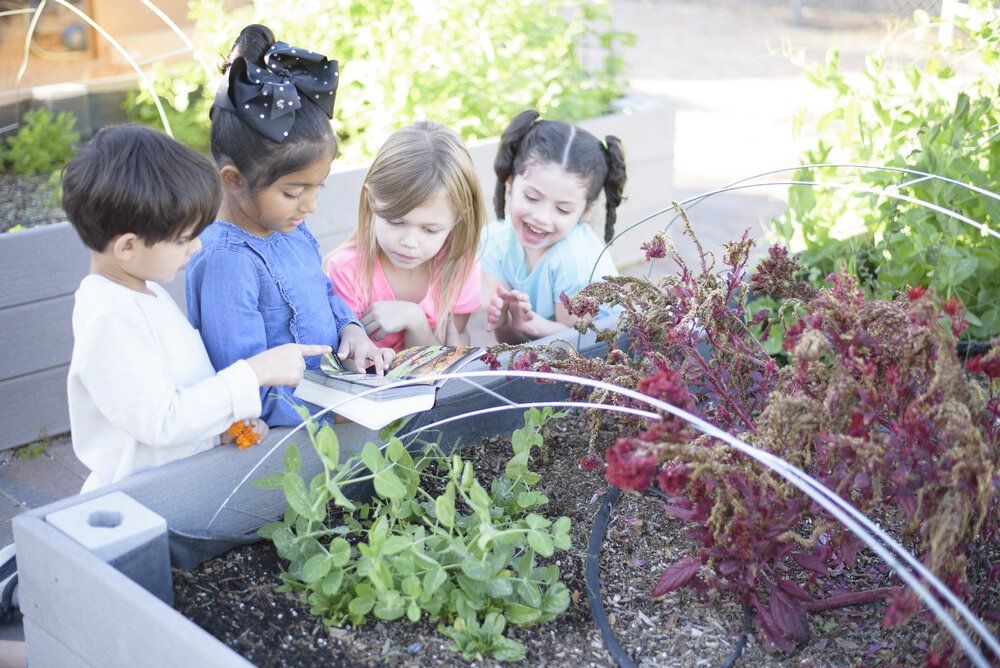Montessori education is a “whole child” approach to teaching that encompasses all areas of child development—cognitive, emotional, social, and physical. It encourages children and adolescents to learn at their own pace in an environment that fosters independence, problem-solving, creativity, and collaboration.
That said, parents may find that Montessori schools do things a little differently than traditional schools. This is not right or wrong; it is simply a different way of encouraging children to learn, and one that may or may not be the ideal fit for your family.
If you’ve found this blog as a result of completing our “Is Montessori a good match for your family?” - Welcome! (If you’d like to explore the quiz, click here.)
Let’s look at the questions from our quiz and which answers resonate most with Montessori parents ( in bold ). This will give you a better understanding of the Montessori classroom so you can consider if it might be a match for your child.
-
When considering options in education for my child, I:
Am open to learning about all methods and want to find one that is the best match for my child
(Believe traditional methods are the best option)
(I am looking for a school like the one I attended (schools are all essentially the same).)
Some parents prefer the structure and familiarity of a traditional classroom setting. Typically what we consider “traditional” classrooms, are those in which children follow the teacher’s plan for the day, are grouped with same age children, sit at desks and have little movement through the classroom, and work on a subject for a determined period of time (eg. 25 minutes for math; 25 minutes for language). Grades are used to identify how the child compares with classmates and subject matter and content proceeds regardless of whether a child has mastered the skill or content.
We all know that children tend to learn in different ways and at different paces. There is not a benefit to them to be held back to do work they have mastered; nor is there a benefit to them to be pushed through materials that they have not understood. This increases the focus on comparison between peers and leads to subjective assessment of “he’s smart” “I’m not”.
The Montessori classroom is designed for children to learn in the way that works best for them as individuals. Skills are focused on until mastered allowing for ever increasing complexity and confidence.
A parent whose child may thrive in a Montessori school setting is one who believes in giving their child the freedom to make choices and guide their own learning journey in an environment that fosters creativity and independent thinking.
2. I am choosing a school for my child to:
Prepare my child academically, socially, and emotionally for school and life
(Ensure basic academic readiness for the next level (ie. preschool, kindergarten, elementary school).)
Montessori education does more than ensure academic readiness. It is designed to prepare children to become thoughtful and well-adjusted adults. This is achieved by creating a consistent pathway for learning that begins as early as infancy and carries through to elementary education and even beyond.
3. I believe children learn best when
(They are grouped with children their own age.)
They work with children their own age and children who are older and younger, expanding their social skills.
Montessori classrooms are mixed age communities that develop their norms and social expectations as a result of spending multiple years together. Children start in a class as a novice and graduate as a leader. They learn to interact with others of all ages; develop patience with younger peers; are inspired by the work of older peers; and are immersed in language that is constantly developing as a result of hearing a range of expressive abilities.
4. I believe concentration, problem solving, motivation, and curiousity are:
Skills that can be built and developed over time
Are personality traits that some people have more of than others
Focus and concentration are skills that can be strengthened through experience and opportunity. Hands-on work that requires focus, slow movement, and concentration reinforces these skills. An environment that limits interruptions, distractions, and shifting of tasks further supports the development of these skills.
5. Children learn best when they are:
Given rewards, like stickers, grades, certificates.
Inspired by their interests and experience satisfaction from a task.
We believe learning should be an exciting and joyful experience for children—something they choose to do without the expectation of rewards for academic outcome, participation, or cooperation.
Instead of stickers or other prizes, the reward a child gets from the Montessori classroom is the self-assuredness that comes from reaching a new level of independence or learning a new skill.
Consider: when are you most inspired to work on a project? When are you most satisfied and proud of a task you have accomplished?
6. My child learns best when in an environment that is:
Orderly, bright, and peaceful
Loud, brightly coloured, and highly visually stimulating
Has objects, toys, books that are freely available to the children
You will notice that Montessori classrooms have a calm, inviting atmosphere that tends to be quieter but somehow more active than a typical kindergarten or elementary school classroom; there are a couple reasons for this.
First, because Montessori students are given the freedom to choose their own activities, they are more likely to be fully engrossed in those activities and less likely to be asking the teacher for direction. Children move at their own pace throughout the classroom, and teachers are there primarily to ensure children are engaged and learning.
Second, because quieter environments have been shown to foster quality learning, Montessori students are encouraged to speak softly with each other and with their teachers. In this way, they learn to respect those around them and promote a positive learning environment.
Third, beautiful materials, books, tools for writing and cutting, and creating are readily available to them.
7. I would prefer that my child is in a school environment that:
Encourages exploration and concentrated work with minimal interruption
(Sticks to a schedule for the whole class to work in specific subject areas at the same time and starts and ends by the clock.)
While traditional classrooms are very structured in terms of time (e.g. 30 minutes each day for Math, 30 minutes each day for Reading, etc.) the Montessori classroom is not.
Instead, children can choose which activities they want to participate in and for how long, so as not to interrupt the learning and exploration process.
As adults we have the opportunity to deeply delve into our work and choose when we have reached a natural ending point or time for a break. In our classrooms we aim to provide sufficient time for the children to work and explore as guided by their own interest level, motivation, and daily concentration. A child immersed in a book is not interrupted simply because “reading period is over”. This simple design builds internal skills such as concentration, focus, independence, self awareness and problem solving.
This is not to say that routines and expectations for time management don’t exist in our classrooms. Of course, children thrive on routines and consistency, but the focus of those routines is grounded in societal norms of grace, courtesy, and community. Children in our school know that every day they will be treated with respect and dignity and asked to be courteous and kind. Within this consistency, the children quickly learn to enter the classroom, place their belongings appropriately, and start working without adult instruction as to what to work on. They are permitted their own pace at which to settle in to work. It is much more similar to adult workplaces than other traditional school settings.
8. I would prefer that my child:
(Change teachers, classes, and peer groups each year.)
Have the opportunity to spend three or more years with the same teacher and children
Ideally, a class community has the same teacher for the three years of your child’s experience. This allows for a depth of knowledge and understanding of your child and a true relationship to form between your child and the teacher. This provides an opportunity for a true partner during these years of your child’s life. It is also an aspect of the strong consistency that allows for comfort, confidence, and contentment in the class.
Obviously, this is not always possible. But inquiring about staff retention and staff satisfaction with their school is a more than reasonable question when exploring schools.
9. At school and home, I want my child to learn to:
Build independence and confidence to take action and make decisions
(Rely on adult directions and requests to make decisions and take action)
One of the primary goals of the Montessori method is to teach children to think and do things for themselves instead of relying on adults. That does not mean that they don’t follow directions, but the environment is designed to build self reliance and confidence. Materials and tools are within reach; children are encouraged to ask a peer for help with work prior to the teacher; children are trusted to move about the classroom and choose their work and work companions.
In the words of the American Montessori Society, “Given the freedom and support to question, probe deeply, and make connections, Montessori students grow up to be confident, enthusiastic, and self-directed learners and citizens, accountable to both themselves and their community.”
10. I want my child to:
(Learn following a curriculum designed for the class level and proceeds according to the school calendar)
Learn at their own pace and advance through a curriculum based on mastery of a skill or understanding.
In a traditional education setting, parents are often told that a child is not “reading at their level” or that they should be “further along by now” in a certain subject or task because of their age.
In the Montessori classroom, children are encouraged to learn at their own pace and given the time and space necessary to fully understand each concept. Children naturally want to learn and understand things, and giving them the freedom and the opportunity to do so is the key to helping them achieve their learning goals. Please explore our level curriculums to get more of a sense of how this works in our school.
11. The most important outcome for my child is to:
(Be prepared to achieve in elementary school/highschool/and beyond)
Meet their potential academically, socially, and emotionally
Be a happy, well-adjusted, and self-motivated human being
Happiness, adjustment, and motivation are predictors of academic and life success. Unfortunately too often, we believe that the opposite is true.
Our schools are intentionally designed to cultivate the social, emotional, and academic skills and support consistent experiences that lead to deep authentic life time happiness.
We believe that self knowledge, independence, creative expression, resiliency, and respect for others are essential building blocks for a peaceful and content humanity.
If you are interested in learning more about Montessori education and its unique benefits, we encourage you to schedule a tour, review our website, visit our blog, or simply call us up to learn more.




